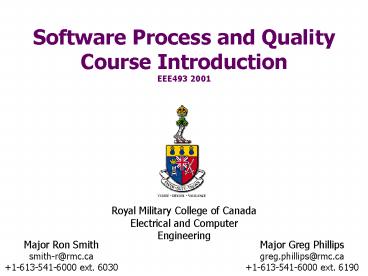Software Process and Quality Course Introduction EEE493 2001 - PowerPoint PPT Presentation
1 / 16
Title:
Software Process and Quality Course Introduction EEE493 2001
Description:
Software Process and Quality Course Introduction. EEE493 2001. Major Greg Phillips ... John Wiley & Sons, 2000. ISBN 0-471-97508-7. Frederick P. Brooks. ... – PowerPoint PPT presentation
Number of Views:18
Avg rating:3.0/5.0
Title: Software Process and Quality Course Introduction EEE493 2001
1
Software Process and Quality Course Introduction
EEE493 2001
Royal Military College of Canada Electrical and
Computer Engineering
- Major Greg Phillips
- greg.phillips_at_rmc.ca
- 1-613-541-6000 ext. 6190
Major Ron Smith smith-r_at_rmc.ca 1-613-541-6000
ext. 6030
2
Todays Agenda
- Introductions
- Why study process and quality?
- Course overview
- Administration
3
Industrial Software Development
- Typical school assignment
- small enough to be completed by 1-2 people in 1-2
weeks (part time) - quality requirements? what quality requirements?
- Industrial software development
- products inherently large and complex
- development typically requires 3 months to 2
years - teams typically range from 5 to 1000 people
- quality problems mean
- inability of project to deliver
- loss of customer confidence
- loss of market share or future contracts
- business failure
- loss of money, property, or life
4
Ariane 5
http//www.esrin.esa.it/htdocs/tidc/Press/Press96/
ariane5rep.html
5
London Ambulance System
http//www.cs.ucl.ac.uk/staff/A.Finkelstein/las.ht
ml
6
Therac-25
IEEE Computer, July 1993, pp. 18-41 also
at http//ei.cs.vt.edu/cs3604/lib/Therac_25/Thera
c_1.html
7
Denver International Airport
Scientific American, September 1994, pp. 8695
8
US Average Project Schedule
Software Productivity Research http//www.spr.com
9
US Average Cancellation Rate
Software Productivity Research http//www.spr.com
10
Course Premise
- The basic premise of the course is that a better
understanding of the software process, both at
the personal and at the organizational level,
will lead to better management of software
projects and to higher-quality software.
11
Objectives
- By the end of the course you should
- understand various software lifecycle models and
standards - use metrics in the software planning process
- understand key issues and practices for building
quality software and - be able to effectively measure and interpret
measurements of both the development process and
the developed products.
12
Structure
- A sequence of lectures covering key themes in
software engineering - planning and control
- development processes
- estimation
- configuration management
- quality metrics
- verification
- A semester long group project using the Extreme
Programming (XP) methodology to develop a small
software application
13
Materials
- Course web site at
- http//phillips.rmc.ca/493/
- Textbooks
- Hans van Vliet. Software Engineering Principles
and Practice. 2nd edition. John Wiley Sons,
2000. ISBN 0-471-97508-7. - Frederick P. Brooks. The Mythical Man-Month
Essays on Software Engineering. 20th Anniversary
Edition. Addison Wesley, 1995. ISBN
0-201-83595-9. - William C. Wake. Extreme Programming Explored.
Draft. To be published by Addison Wesley, 2001.
ISBN 0-201-73397-8 http//users.vnet.net/wwake/
14
Evaluation
- Development project (30)
- Reading assignments (10)
- Midterm exam (20)
- Course final (40)
- The final will examine material from the entire
course with a slightly heavier weight on material
not already examined on the midterm.
15
eProps
- before tomorrows lab period you must read the
five Key eProps documents on the course web
site - http//phillips.rmc.ca/493/eProps/eProps.html
16
Next ClassIntroduction to Extreme Programming































